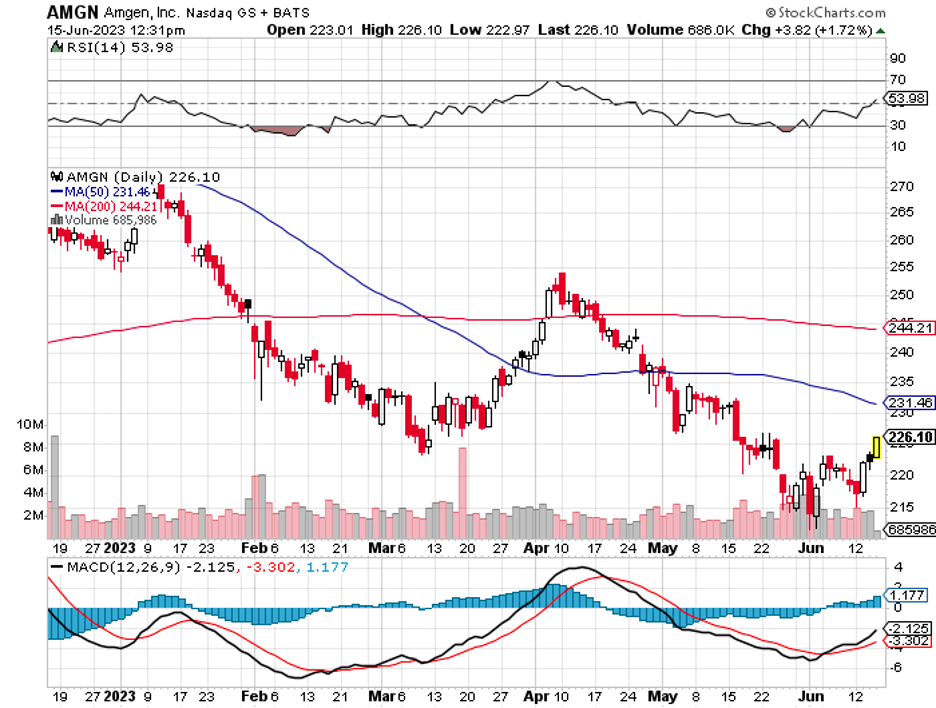A Rollercoaster Ride on the Biotech Highway
What gets my heart racing about Wall Street's wild rodeo is its capricious personality. This unpredictable creature weaves a tapestry of inflated possibilities, stretching across a vibrant spectrum of asset classes. It's like being at an all-you-can-eat financial buffet; every day, there's a fresh plate of opportunities to dig into.
Just last year, for instance, we saw a grand opportunity to pack our portfolios with tech titans like Amazon (AMZN) and Microsoft (MSFT) when the market was frolicking after cash-flush pharmaceutical stocks, allured by their pricing power and inflation defense.
But oh, how the pendulum swings. Today, we find the market donning its risk-taking garb again, pursuing high-growth stocks and leaving value stocks eating its dust.
This brings us to Amgen (AMGN).
Amgen, a trailblazer in the biotech industry since its inception in 1980, has earned its stripes, boasting membership in the esteemed Dow Jones Industrial Index and Nasdaq 100. Over the past year, AMGN churned out an impressive $26 billion in total revenue.
The company proudly displays a well-rounded product portfolio experiencing a strong global thirst. This is echoed by the hearty 14% YoY volume growth in the first quarter.
Notably, much of this surge was fueled outside U.S. borders, with the Asia Pacific region flexing a muscular 47% volume growth. Credit this partly to the rapidly aging populations in Japan and China, where medicines like Amgen’s Repatha and Prolia are enjoying a burgeoning demand.
However, we're not getting the complete picture from these favorable metrics.
Amgen is embarking on a journey into a period filled with question marks, marked by stiff competition from biosimilars for its aging blockbusters, pushback from the Federal Trade Commission over its proposed acquisition of Horizon Therapeutics (HZNP), and valid doubts surrounding the rationale behind this hefty $28 billion buyout.
The firm has had a tough time finding a true growth engine in recent years, despite launching several new drugs for high-value indications such as lung cancer, cardiovascular disease, and migraine headaches. Can Amgen sail past these patent headwinds?
While most in the industry are betting on Amgen to win its legal battle to acquire Horizon, this move carries its own set of hitches.
The spotlight is on Horizon's primary growth engine, Tepezza, which is dealing with recent commercial setbacks.
In Q1 2023, Tepezza sales took an 18% sequential dip from Q4 2022 and were down 19% YoY.
Horizon blamed seasonality for this significant sales dip, which is disheartening for a drug slated to hit $4 billion in annual sales.
If Tepezza is the mainstay behind the proposed merger with Amgen, the biotech could set itself up for a rocky journey.
And remember, Amgen's previous attempts at value creation via business development haven't always been home runs.
Take the 2013 acquisition of Onyx's cancer drug Kyprolis. Despite initial excitement, Kyprolis has underperformed expectations, illustrating that Amgen's $28 billion bid for Horizon may not be a guaranteed solution to its patent woes.
Furthermore, Amgen's clinical pipeline isn't bursting with potential stars.
Its metabolic disorder candidate AMG 133 has been flagged as a potential blockbuster by some analysts, but the obesity treatment market is heating up. The same applies to Amgen's various candidates in hematology and immunology. Therefore, its current pipeline might not be the panacea to its legacy medicine challenges.
So, what's the play for investors?
The silver lining here is that Amgen isn't predicted to suffer a sharp drop in annual sales anytime soon, irrespective of the Horizon deal or its internal pipeline.
The main concern lies with the drugmaker's potential to resurrect robust top-line growth in the latter part of the decade. Given its low trailing-12-month payout ratio of 54%, the dividend appears to be on solid ground, which is a tick-in-the-box for its prospects as an income stock.
Overall, this stock could be a top pick for income investors considering its ample yield coverage, substantial margins, and double-digit average dividend growth.
Although the top line may seem a little shaky, buybacks should help keep EPS growth on track. Given its resilience, the stock presents an attractive opportunity for income investors. Just don't hold your breath waiting for a sudden surge.
In fact, if you're on a DRIP (Dividend Reinvestment Plan), you'd rather want the shares to slump for a bit.
After all, Amgen has the makings of a SWAN (Sleep Well At Night) stock. So, keep those midnight snacks handy.




